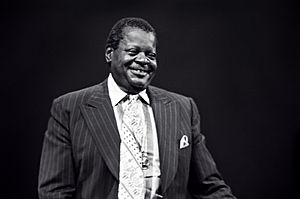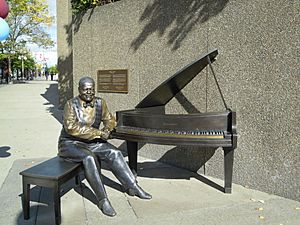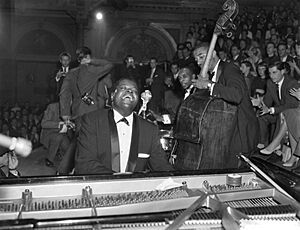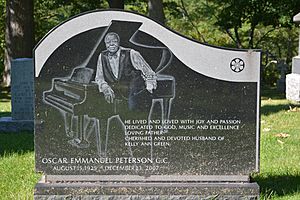Oscar Peterson facts for kids
Quick facts for kids
Oscar Peterson
|
|
|---|---|

Peterson in 1977
|
|
| Background information | |
| Birth name | Oscar Emmanuel Peterson |
| Born | August 15, 1925 Montreal, Quebec, Canada |
| Died | December 23, 2007 (aged 82) Mississauga, Ontario, Canada |
| Genres | |
| Occupation(s) |
|
| Instruments |
|
| Years active | 1945–2007 |
| Labels | |
| Associated acts |
|
Oscar Emmanuel Peterson (August 15, 1925 – December 23, 2007) was a famous Canadian jazz pianist and composer. He was an amazing musician, considered one of the greatest jazz pianists ever.
Peterson made over 200 recordings and won eight Grammy Awards. He also received a special lifetime achievement award. He performed thousands of concerts around the world for more than 60 years. People called him the "Maharaja of the keyboard" and "the King of inside swing."
Oscar Peterson often played in small groups. He worked in duos (two musicians) with Niels-Henning Ørsted Pedersen and Joe Pass. He also played with Count Basie and Herbie Hancock. He felt that playing in a trio (three musicians) with Ray Brown and Herb Ellis was the most exciting. This trio made many great recordings and performed live.
Peterson won eight Grammy Awards between 1975 and 1997. He is known as one of the best jazz pianists and improvisers of the 20th century.
Contents
Biography
Early Life and Music Training
Oscar Peterson was born in Montreal, Quebec, Canada. His parents came from the West Indies. His father, Daniel, worked for the railway and taught himself to play music. He taught Oscar to play the organ, trumpet, and piano.
Oscar grew up in a neighborhood called Little Burgundy in Montreal. This area was full of jazz music and culture. When he was five, Oscar started learning the trumpet and piano. But at age seven, he got tuberculosis, a serious illness. This stopped him from playing the trumpet. So, he focused all his energy on the piano.
His father was his first piano teacher. His sister, Daisy, also taught him classical piano. Oscar practiced a lot every day, learning musical scales and classical pieces.
As a child, Oscar also studied with Paul de Marky, a Hungarian pianist. This meant his early training was mostly in classical piano. But he loved traditional jazz and boogie-woogie music. He learned many ragtime songs. People even called him "the Brown Bomber of the Boogie-Woogie."
By age nine, Oscar played the piano with amazing skill. He practiced four to six hours daily for many years. Later in life, he still practiced one or two hours a day. In 1940, when he was 14, he won a national music competition. This was organized by the Canadian Broadcasting Corporation. After winning, he left high school to become a professional pianist. He starred in a weekly radio show and played in hotels. From 1945 to 1949, he played in a trio and made recordings. He loved boogie-woogie and swing music. He especially liked Nat King Cole and Teddy Wilson. By his early twenties, he was known as a brilliant and creative pianist.
Forming Musical Groups

In 1949, a music producer named Norman Granz heard Oscar playing on the radio. He was so impressed that he went to the club to meet him. Granz later introduced Oscar in New York City at a big concert. Granz became Oscar's manager for most of his career.
Granz also helped Oscar and other black jazz musicians during a time of segregation in the southern U.S. He stood up for them when they faced unfair treatment.
In 1950, Oscar started playing with double bassist Ray Brown. Two years later, they added guitarist Barney Kessel. Later, Herb Ellis joined the trio. This trio played together from 1953 to 1958. They often toured with "Jazz at the Philharmonic" concerts.
When Herb Ellis left in 1958, they hired drummer Ed Thigpen. They felt no other guitarist could be as good as Ellis. Brown and Thigpen played with Oscar on famous albums like Night Train. Both left in 1965. They were replaced by bassist Sam Jones and drummer Louis Hayes. This trio played together until 1970.
In the 1970s, Oscar formed a new trio. It included guitarist Joe Pass and bassist Niels-Henning Ørsted Pedersen. This trio was very successful, just like his earlier one. Their album The Trio won a Grammy Award in 1974. In 1974, British drummer Martin Drew joined them, making it a quartet. This group toured and recorded all over the world.
Oscar also worked with other jazz greats. These included saxophonist Ben Webster, trumpeter Clark Terry, and vibraphonist Milt Jackson. In 1961, his trio recorded the album Very Tall with Milt Jackson. In the 1980s, he played in a duo with pianist Herbie Hancock. Later, he played with his student Benny Green.
Health Challenges and Later Years
Oscar Peterson had arthritis from a young age. This made it hard for him to do simple things like button his shirt. He also gained a lot of weight, which made it harder to move around. He had hip surgery in the early 1990s, but his movement was still limited.
In 1993, Oscar had a stroke. This weakened the left side of his body. He couldn't work for two years. Although he got some movement back in his left hand, his piano playing changed. He mostly used his right hand. Even with one hand, his friend Bob Rae, a politician and pianist, said "a one-handed Oscar was better than just about anyone with two hands."
In 1995, he started performing again sometimes. He also made new recordings. In 1997, he received the Grammy Lifetime Achievement Award. This award honors musicians who have made important contributions to music over many years.
In 2003, Oscar recorded a DVD called A Night in Vienna. He continued to tour the U.S. and Europe, but only for about a month each year. He needed to rest between concerts. In 2007, his health got worse. He passed away on December 23, 2007, from kidney failure at his home in Mississauga, Ontario.
Personal Life and Teaching
Oscar Peterson was married four times and had seven children. He loved to cook and often tried to stop smoking. He remained overweight throughout his life.
Oscar taught piano and improvisation in Canada, mostly in Toronto. In the 1960s, he helped start a music school called the Advanced School of Contemporary Music. It ran for five years but closed because Oscar and his partners were often away on tour.
Musical Style and Influences
Oscar Peterson was influenced by other great pianists like Teddy Wilson, Nat King Cole, and Art Tatum. Many people compared Oscar to Art Tatum. Oscar once said that Tatum "scared me to death" and made him realize he needed to work even harder. Tatum was a big role model for Oscar in the 1940s and 1950s. They became good friends, but Oscar was always a bit shy about playing piano in front of Tatum.
Oscar also said his sister, Daisy, was a very important teacher for him. She taught him classical piano. This helped him learn many different styles of music. He asked his own students to study the music of Johann Sebastian Bach. He believed Bach's music was essential for any serious pianist. Two of his students were pianists Benny Green and Oliver Jones.
Oscar also learned from the music of classical composers like Sergei Rachmaninoff. You can hear parts of Rachmaninoff's music in many of Oscar's recordings. This shows how he blended different styles into his own unique sound.
Some people say that Oscar's best playing was when he was supporting other musicians. For example, he was an amazing accompanist for singer Ella Fitzgerald and trumpeter Roy Eldridge.
Legacy
Oscar Peterson is remembered as one of the greatest jazz pianists in history. Duke Ellington called him the "Maharaja of the keyboard." His friends called him "O.P.," and in the jazz world, he was known as "the King of inside swing."
Oscar Peterson has been honored in many ways. He appeared on postage stamps in Austria (2003) and Canada (2005). In 2021, a documentary film about his life called Oscar Peterson: Black + White was released. In 2022, he was featured on a special Canadian one-dollar coin, known as a 'loonie'.

Awards and Honours
Grammy Awards
- 1975 Best Jazz Performance by a Group The Trio
- 1977 Best Jazz Performance by a Soloist The Giants
- 1978 Best Jazz Instrumental Performance, Soloist Oscar Peterson Jam – Montreux '77
- 1979 Best Jazz Instrumental Performance, Soloist Oscar Peterson and The Trumpet Kings – Jousts
- 1990 Best Jazz Instrumental Performance, Group Live at the Blue Note
- 1990 Best Jazz Instrumental Performance, Soloist The Legendary Oscar Peterson Trio Live at the Blue Note
- 1991 Best Jazz Instrumental Performance, Group Saturday Night at the Blue Note
- 1997 Lifetime Achievement Award Instrumental Soloist Lifetime Achievement
Other Awards
- Pianist of the year, DownBeat magazine, 1950, and for the next 12 years
- Order of Canada, Officer, 1972; Companion, 1984
- Canadian Music Hall of Fame, 1978
- Governor General's Performing Arts Award, 1992
- Order of Ontario, member 1992
- Glenn Gould Prize, 1993
- Praemium Imperiale World Art Award, 1999
- Oscar Peterson Concert Hall named at Concordia University, 1999
- UNESCO Music Prize, 2000
- Canada's Walk of Fame, 2013
- Canadian Jazz and Blues Hall of Fame
- Juno Award Hall of Fame
- BBC Radio Lifetime Achievement Award
- National Order of Quebec, Chevalier
- Ordre des Arts et des Lettres, France
- Oscar Peterson Theatre, Canadian Embassy, Tokyo, Japan, 2007
- Oscar Peterson Hall, University of Toronto Mississauga, 2008
- Oscar Peterson Public School, Stouffville, 2009
- Parc Oscar-Peterson, Little Burgundy, Montreal, renamed in Peterson's honour 2009
- Statue of Oscar Peterson unveiled in Ottawa by Queen Elizabeth II, 2010
- Jazz Born Here, mural by Gene Pendon depicting Oscar Peterson, in Montreal
- Historica Canada Heritage Minute, 2021
- Honorary degrees from many universities, including Berklee College of Music and University of Toronto
Instruments
Oscar Peterson played many different kinds of pianos and keyboards:
- Bösendorfer pianos
- Yamaha pianos
- Steinway & Sons pianos
- Baldwin pianos
- C. Bechstein Pianofortefabrik pianos
- Petrof pianos
- Clavichord – on the album Porgy and Bess
- Fender Rhodes electric piano
- Synthesizer
- Hammond organ
- Vocals (singing)
Discography
See also
- Music of Canada
- List of jazz pianists
See also
 In Spanish: Oscar Peterson para niños
In Spanish: Oscar Peterson para niños
 | Isaac Myers |
 | D. Hamilton Jackson |
 | A. Philip Randolph |



